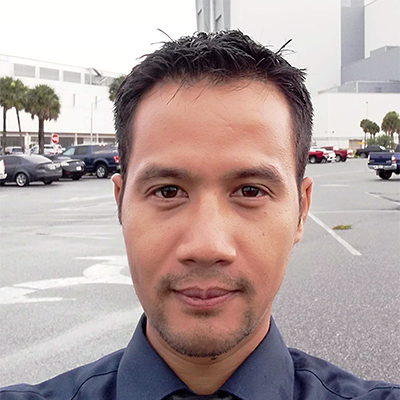Simulated Encounters of the Third Kind: Scenario-Based Approach to Designing Guide Robots
Abstract: Navigating through unfamiliar environments is a challenging task. For people who are blind or have low vision (BLV), navigation can be particularly daunting. Guide robots are a type of service robot that can assist BLV people with navigation tasks. A significant amount of research related to guide robots has focused on technical contributions, while a [...]
Composing Generative and Discriminative Models for Better Generalization
Abstract: Computer Vision is Correspondence, correspondence, correspondence! Inspite of the singular definition of computer vision, we still have two broad categories of approaches in the literature. Generative Models, like Stable Diffusion, learn a correspondence between image and text modality, while learning a mapping from text to image. Discriminative Models, like CLIP, on the other hand [...]
Lower Bounds for Moving Target Traveling Salesman Motion Planning with Obstacles
Abstract: We study the problem of finding a trajectory for an agent to intercept a number of moving targets while avoiding obstacles. Applications include resupplying naval ships at sea and recharging aerial vehicles with a ground vehicle. We model the problem as an extension of the traveling salesman problem, which we refer to as the [...]
Towards Pragmatic Time Series Intelligence
Abstract: The widespread adoption of time series machine learning (ML) models faces multiple challenges involving data, modeling and evaluation. Data. Modern ML models depend on copious amounts of cohesive and reliably annotated data for training and evaluation. However, labeled data is not always available and reliable, and can also be dispersed across different locations. We [...]
Probabilistic 3D Multi-Object Cooperative Tracking for Autonomous Driving via Differentiable Multi-Sensor Kalman Filter
Abstract: Current state-of-the-art autonomous driving vehicles mainly rely on each individual sensor system to perform perception tasks. Such a framework's reliability could be limited by occlusion or sensor failure. To address this issue, more recent research proposes using vehicle-to-vehicle (V2V) communication to share perception information with others. However, most relevant works focus only on cooperative [...]
Super Odometry: Selective Fusion Towards All-degraded Environments
Abstract: Robust odometry is at the core of robotics and autonomous systems operating navigation, exploration, and locomotion in complex environments for a broad spectrum of applications. While great progress has been made, the robustness of the odometry system still remains a grand challenge. This talk introduces Super Odometry, an approach that leverages selective fusion to [...]
Improved Surface Estimation for use in Virtual Fixtures during Retinal Surgery
Abstract: Retinal surgery procedures require surgeons to manipulate very delicate tissues with little room for error. During epiretinal membrane surgery, to reduce chances of recurrence, surgeons may have to remove the 10 µm thick internal limiting membrane from the retinal surface. An experimental procedure to treat retinal vein occlusion is retinal vein cannulation. During this [...]
Causal Robot Learning for Manipulation
Abstract: Two decades into the third age of AI, the rise of deep learning has yielded two seemingly disparate realities. In one, massive accomplishments have been achieved in deep reinforcement learning, protein folding, and large language models. Yet, in the other, the promises of deep learning to empower robots that operate robustly in real-world environments [...]
Robot Learning by Understanding Egocentric Videos
Abstract: True gains of machine learning in AI sub-fields such as computer vision and natural language processing have come about from the use of large-scale diverse datasets for learning. In this talk, I will discuss how we can leverage large-scale diverse data in the form of egocentric videos (first-person videos of humans conducting different tasks) [...]
Special Seminar
Speaker: Abhisesh Silwal Title: Robotics and AI for Sustainable Agriculture Abstract: Production agriculture plays a critical role in our lives, providing food security and enabling sustainability. Despite its immense importance, it currently faces many challenges including shortage of farmworkers, increasing production costs, excess use of herbicides just to name a few. Robotics and artificial intelligence-based [...]
Learning to Manipulate Using Diverse Datasets
Abstract: Autonomous agents can play games (like Chess, Go, and even Starcraft), they can help make complex scientific predictions (e.g., protein folding), and they can even write entire computer programs, with just a bit of prompting. However, even the most basic physical manipulation skills, like unlocking and opening a door, still remain literally out-of-reach. The [...]
Passive Ultra-Wideband Single-Photon Imaging
Abstract: High-speed light sources, fast cameras, and depth sensors have made it possible to image dynamic phenomena occurring in ever smaller time intervals with the help of actively-controlled light sources and synchronization. Unfortunately, while these techniques do capture ultrafast events, they cannot simultaneously capture slower ones too. I will discuss our recent work on passive ultra-wideband [...]
3D Perception In-The-Wild
Abstract: State estimation is a fundamental component of embodied perception. Contemporary autonomous vehicle (AV) benchmarks have advanced techniques for training 3D detectors, particularly on large-scale data. Notably, although prior work has nearly solved 3D object detection for a few common classes (e.g., pedestrian and car), detecting many rare classes in-the-tail (e.g., debris and stroller) remains [...]
Learning on the Move: Integrating Action and Perception for Mobile Manipulation
Abstract: While there has been remarkable progress recently in the fields of manipulation and locomotion, mobile manipulation remains a long-standing challenge. Compared to locomotion or static manipulation, a mobile system must make a diverse range of long-horizon tasks feasible in unstructured and dynamic environments. While the applications are broad and interesting, there are a plethora [...]













